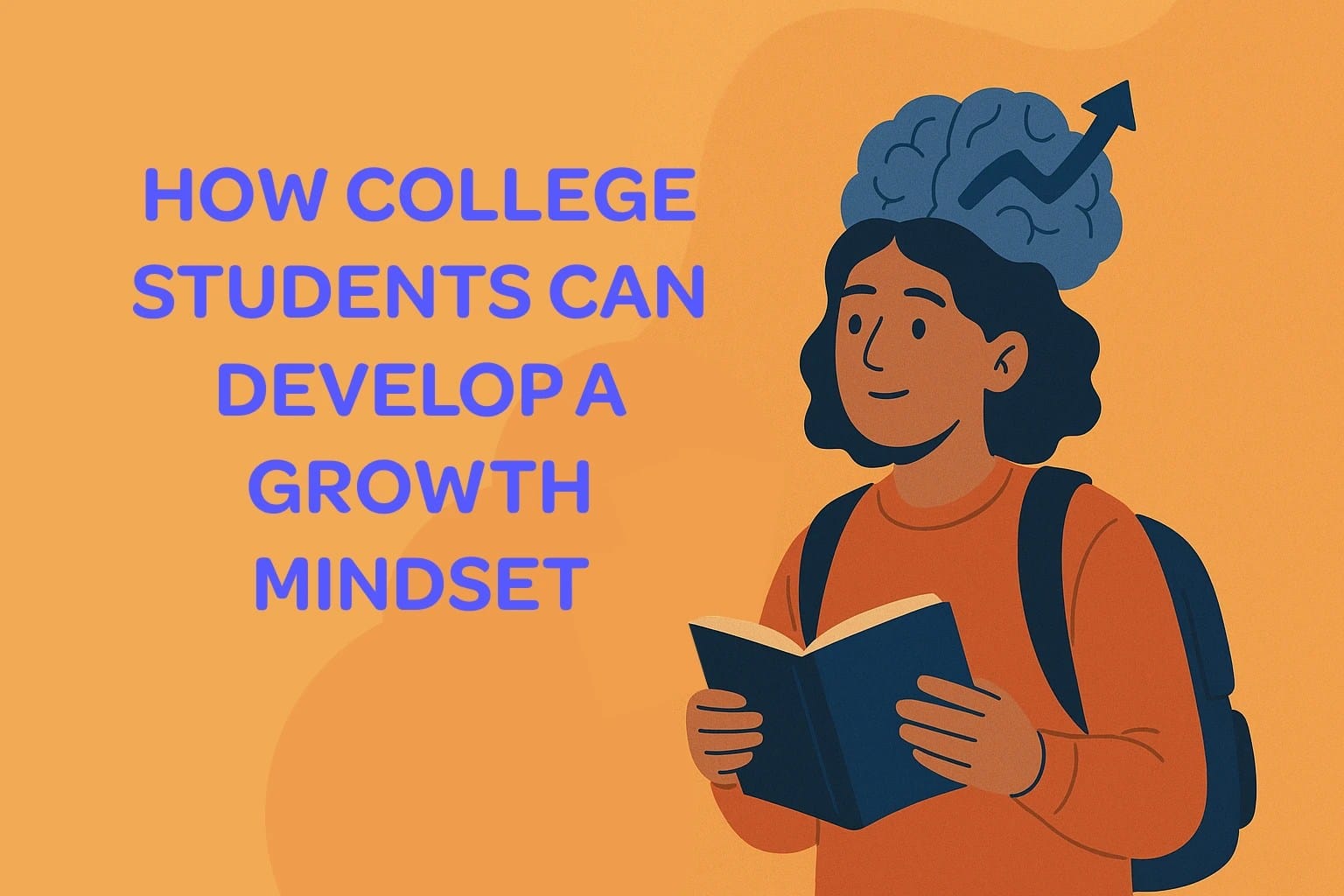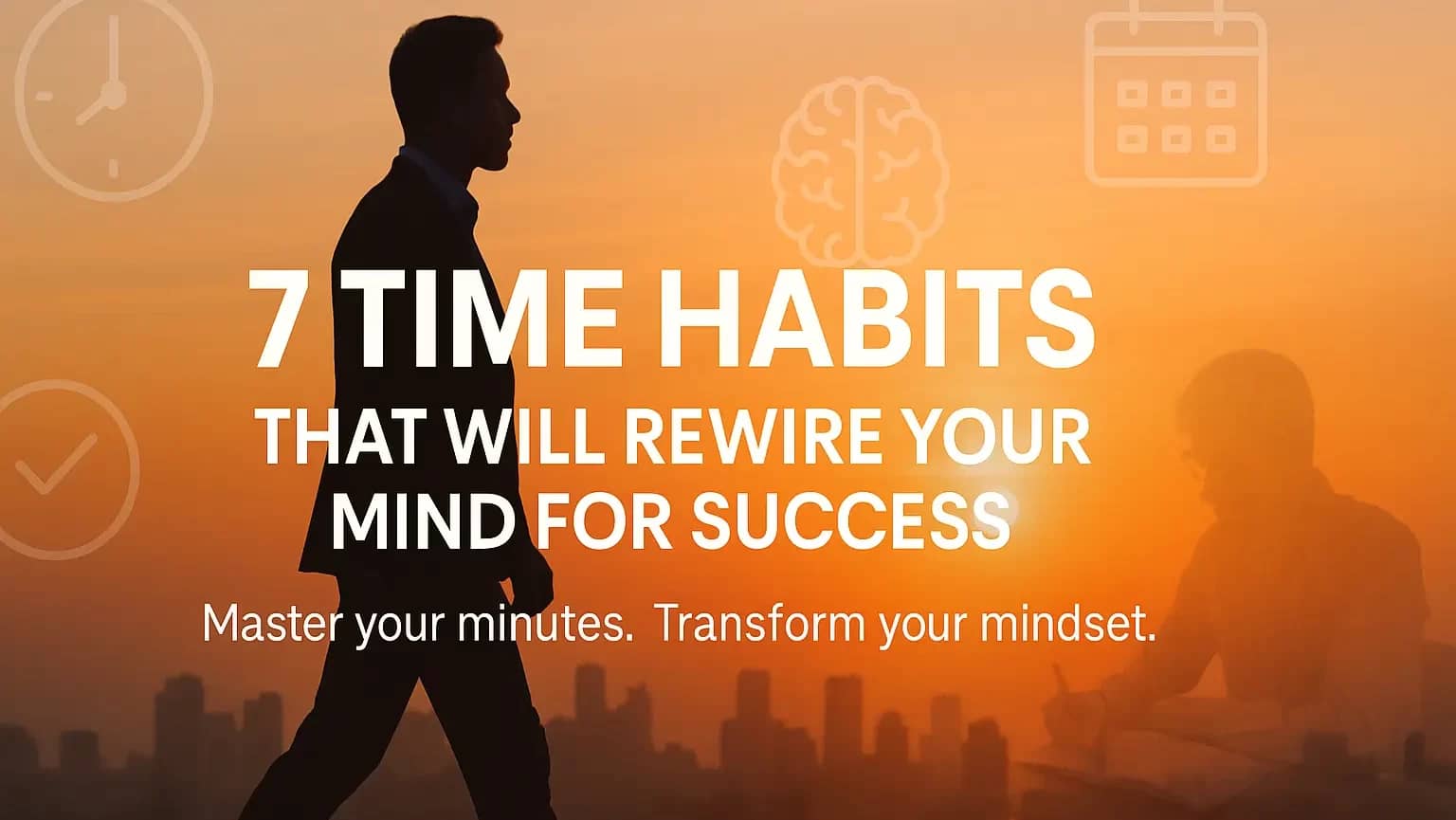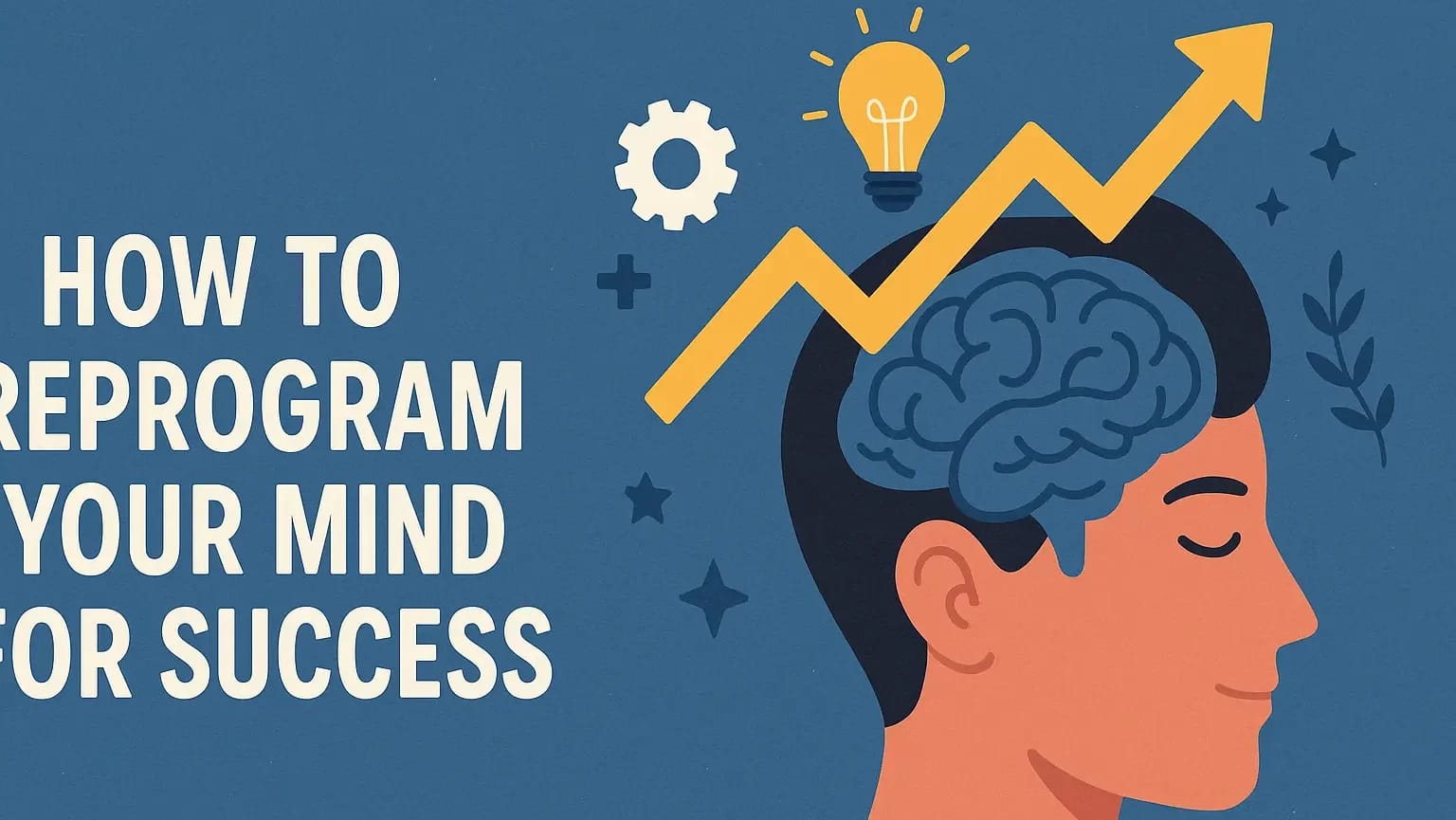For all of my college students, you have probably asked yourself: How can I develop a growth mindset? Or maybe even, why does it even matter? With only 1 in 3 college students dropping out, it might seem like success is reserved for naturally gifted people. But is that the case?
Chances are, you have felt behind at some point—watching classmates breeze through exams while feeling frustrated, discouraged, and questioning your intelligence. If that sounds familiar, you are not alone.

Here is the secret: Success in college is not just about raw talent; it is about how you think about learning. And that is where a growth mindset comes in. In this article, we will break down what a growth mindset is and guide you through practical steps to build one, so you can boost your academic performance and confidence.
Let’s dive right in.
Fixed vs. Growth Mindset
One way college students can develop a growth mindset is by first understanding what differentiates it from a fixed mindset.
Imagine two people with the same goal of becoming a millionaire. One believes reaching that milestone is only possible through luck or a family inheritance. The other knows this goal is achievable through continuous learning, hard work, and dedication.

These two mindsets highlight a key difference between a fixed and a growth mindset. Psychologist Carol Dweck, who coined the term growth mindset in her book Mindset: The New Psychology of Success, describes it as the development of intelligence and success through continuous learning, growth, and effort. In contrast, someone with a fixed mindset believes that intelligence and success are innate traits, meaning you either have them or you don’t.
In a world filled with ambition and competition, you probably share common goals with others. But what truly separates you from the rest isn’t just talent or opportunity—it’s your mindset. Will you remain stuck thinking you can’t grow or improve? Or will you embrace the growth mindset, trusting that you can achieve anything with consistent effort?
Why does mindset matter?
Mindset matters for countless reasons, especially today, in a world of distractions competing for your attention. When working toward a meaningful goal, the people you surround yourself with and the content you consume, particularly on social media, play a huge role. These influences can either lift you and support your growth or feed into a fixed mindset, convincing you that you are not worthy or capable of success.
Take a moment to think about one of your biggest goals—a goal that keeps you up at night. Something that feels bigger than yourself. Maybe it is becoming the first millionaire in your family, or getting accepted into your dream school. Whatever that goal is, I want you to know it is 100% possible.

Now, you might feel doubt creeping in. Your mind might be racing with reasons why that goal is not realistic. Maybe I am not smart enough, or there is no way I can do it. Sound familiar?
This is where your mindset comes into play. Developing a growth mindset starts with recognizing and rejecting the lies your fixed mindset tries to tell you. Yes, challenges will come; they are inevitable. But they are not stop signs; they are stepping stones. Thus, mindset matters because how college students develop a growth mindset establishes the foundation for how they approach challenges, not only in college but throughout their lives.
If you are in college and holding onto a dream, do not let go. In this article, I will help you make the mindset shift you need so that you can turn that goal into your reality.
How to develop a growth mindset for college students
Doubt, setbacks, and rejection are challenges every ambitious person faces when working toward a meaningful goal. When you are developing a growth mindset, you cannot let these obstacles become the reason you give up. Instead, see them as learning opportunities that bring you one step closer to your goals.
Some may argue that college grades do not matter. Nevertheless, college is the perfect time to practice building strong work habits and develop a growth mindset that will benefit you after graduation. To succeed both academically and in your future career, your mindset is crucial.
Here’s how college students can develop a growth mindset:
1. Become an active learner
Have you ever walked out of a class feeling confident, only to realize later that you can not recall much of what was covered? Maybe you took notes, nodded along, and felt like you understood everything in the moment, but when it came time to study or take a test, the material was nowhere to be found.
This issue is common for many students and stems from relying too heavily on passive learning methods. According to the “Learning Pyramid” developed by the National Training Laboratories (NTL), active learning is far more effective than passive strategies like simply listening to lectures or reading textbooks. When students depend on these methods, they are less likely to retain the material and more likely to struggle when it matters most.

The brain does not retain information by exposure alone. To truly understand and remember what you are learning, you must engage with the material actively by solving practice problems, discussing ideas, teaching others, or applying concepts in new ways. These strategies help move information from short-term memory into long-term understanding.
Therefore, if you are struggling in your classes, take a step back and evaluate your learning habits. Attending lectures is essential, but it is only one part of the equation. Real learning happens when you take the initiative to engage deeply with the content outside of class. More often than not, academic struggles are not about intelligence; they are about approach. By becoming an active learner, you can transform how you absorb information and dramatically improve your academic performance.
2. Seek feedback and apply it
When it comes to receiving feedback, people usually fall into two categories: those who appreciate it and those who let their egos get in the way. Instead of being open, they fear feedback, often because they associate it with judgment or criticism.

If you are a student who struggles to accept feedback, there is a good chance your grades reflect that. Feedback is a powerful tool—not only does it reveal your weaknesses, but it also allows you to learn and grow from your mistakes.
Being open to feedback is just the first step. What truly matters is how you use it. Without action, feedback loses its value. The more you apply what you have learned, the more aware you become of your patterns, which creates even more opportunities for improvement and growth.
3. Don’t let grades define you
Nobody wants to fail, but sometimes, failure is exactly what we need to grow. It’s not just a setback; it’s a learning opportunity and a chance to build resilience.
You’ll face numerous challenges from academic struggles, social pressures, and personal doubts in college. It won’t always be easy. But instead of letting these experiences define you, you can use them to develop strength and adaptability.

One of the most common obstacles college students face is poor grades. After failing an exam, it’s easy to fall into self-doubt and assume you’re not smart enough to succeed. As a result, your confidence drops, and so does your effort. But the truth is, grades often reflect your level of effort, not your intelligence.
Ask yourself: Are you reviewing consistently after class? Are you seeking help during office hours? Are you putting in the time to truly understand the material? A 2022 study showed that the more effort you put into learning, the better you’ll retain and recall the information. Once you shift your mindset and start linking your performance to your effort, you’ll be surprised by how much you’re capable of.
4. Identify and work on your weaknesses
We all have things we are proud of and things we would rather keep to ourselves. While it is easy to highlight our strengths, our weaknesses inevitably come to light, especially in college.
College life has a way of exposing our shortcomings, whether it is poor time management, procrastination, or ineffective study habits. But growth begins when we face these weaknesses head-on and commit to improving them.

Conquering academic challenges starts with self-awareness. It requires humility and the willingness to assess what is working and what is not. Take the time to reflect honestly on your habits and routines. The more effort you put into strengthening your weaknesses, rather than just polishing your strengths, the more you will develop into a successful and resilient student.
5. Eliminate bad habits
Despite how it may appear, there is no such thing as overnight success. Sure, it might look like people suddenly blow up on social media or in business, but you do not see the countless hours they spend working behind the scenes, often filled with self-doubt and uncertainty. Their success came from consistency, perseverance, and the daily discipline to keep going, even when results were not guaranteed.
The same principle applies in college. You cannot expect to study once for a midterm and coast toward a passing grade. Academic success is built on habits—regularly reviewing material, practicing problems, and actively engaging with what you are learning. Everyone has different study methods. What matters most is finding what works for you and sticking with it.

Equally important is removing habits that hold you back. Whether it’s procrastination, staying up too late, or partying when you should be focused, these choices eat away at the time and energy you need for your goals. The more intentionally you invest your time in school, the more your academic performance and mental health will thrive.
6. Create a “failure resume”
People fear many things, and one of the most common is failure. And it is understandable—no one enjoys seeing hours of effort seemingly go to waste or facing rejection. But the truth is, failure is an unavoidable part of life. The more we learn to accept and grow from it, the stronger and more resilient we become.
Johannes Haushofer, an economist with honors from Oxford and two PhDs, went viral for sharing something unusual: a CV of Failures. This document listed all the academic programs he did not get into and the jobs he was rejected from. Rather than hiding his setbacks, he highlighted them, showing that failure is not the exception, but the norm, even for highly accomplished individuals. Therefore, one

Haushofer’s example is a powerful reminder that failure is not something to fear; it is something to expect, learn from, and grow through. For college students, this mindset shift is crucial.
By embracing failure, we develop a growth mindset, recognizing that effort and persistence matter more than perfection. This mindset helps us learn from our mistakes and quiet the voice of impostor syndrome that often creeps in when we experience failure or rejection.
Failure does not define you—how you respond to it does.
7. Create that “cookie jar”
When pursuing something bigger than yourself, like graduating or building a career, you will run into self-doubt. Sometimes, self-doubt helps us reflect and improve, but more often, it chips away at our confidence. Left unchecked, it can even make us want to give up entirely.
David Goggins, a former Navy SEAL known for conquering extreme physical challenges, developed a powerful strategy to push through moments of doubt. He called it the “cookie jar”—a mental collection of his accomplishments. Whenever he felt like quitting, he’d reach into this jar and “take a bite” of positive memories, fueling himself to keep going.

As a college student, you can use this same technique whenever self-doubt creeps in. If you’re up late studying and doubting whether you’ll pass, remind yourself of the classes you’ve already conquered. When you feel like quitting, think about how rare and meaningful it is to be accepted into your school in the first place.
Taking “bites” from your cookie jar helps build academic resilience—a key part of developing a growth mindset. By drawing strength from your past achievements, you reinforce the belief that success isn’t about innate talent but about hard work and perseverance. This confidence can carry you through even the toughest challenges.
Conclusion
As school comes and goes, it’s important to remember that college is just one stage in life. It’s filled with highs and lows, but none of those moments last forever. How you spend your college years matters, as they will build or destroy you.
Along the way, you’ll face numerous challenges: academic pressure, fitting in, finding employment, and more. The best way to overcome these obstacles is by adopting a growth mindset. Doing so means letting go of unhelpful habits, becoming an active learner, and even creating a “CV of failures” to embrace setbacks as opportunities for growth.
The more time and effort you invest in your learning, the more you’ll develop intellectually, mentally, and emotionally. College is a time of transformation, and your mindset will guide how far you go.
How can you, as college students, take action to develop a growth mindset to benefit you in your studies?


